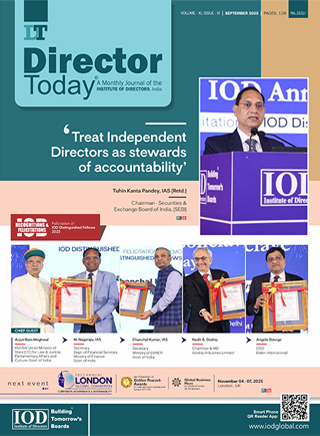Corporate Governance in New Zealand

Diversity, Sustainability, and Technology Leading the Way
Insights from the Institute of Directors, New Zealand
The corporate governance landscape in Aotearoa New Zealand is evolving, driven by global shifts in environmental, social, and governance (ESG) expectations, technological advancements, and the increasing emphasis on diversity and board capability.
Insights from the latest Institute of Directors in New Zealand's Director Sentiment Survey and key governance publications shed light on the focal points for boardrooms this year.
Effective boards require not only a diversity of skills and experiences but also an ongoing commitment to learning and development.
1. Focus on sustainability and ESG reporting
One of the most significant trends in New Zealand boardrooms is the growing focus on sustainability and ESG reporting. As highlighted in the NZX ESG Guidance Note 2023, businesses are increasingly expected to disclose their environmental, social, and governance practices and how these align with long term strategy. This aligns with the global push towards responsible investment, where sustainability factors are playing a pivotal role in investment decisions. In New Zealand, companies are under pressure to comply with climate-related disclosures and demonstrate their commitment to reducing carbon footprints, in line with the Climate Change Response (Zero Carbon) Amendment Act 2019.
For boards, this means incorporating sustainability into their strategic thinking, ensuring ESG factors are not just an add-on but are integrated into the company's business model. Directors need to oversee robust ESG frameworks, which include monitoring sustainability performance, understanding climate risks and ensuring transparent reporting to shareholders.
In 2025, success will depend on how well boards integrate sustainability into their long term strategy, develop diverse leadership, and build technological capability to oversee innovation and cybersecurity risks.
2. Diversity and inclusion as a strategic imperative
Diversity continues to be a major topic in New Zealand governance, and it is now regarded as a strategic priority for many boards. The Institute of Directors in NZ (IOD), champions diversity of thought and background because this can contribute to more innovative and effective decision-making. However, while there have been improvements in gender diversity – especially on statesector boards – corporate boards still lag behind in achieving a truly diverse composition.
The IOD's Getting on Board with Diversity guide emphasises that diversity should not be a 'tick-box' exercise but rather a process that enhances board effectiveness by bringing different perspectives into discussions . Boards are being encouraged to review their composition regularly, set diversity targets, and integrate these into their succession planning. This is reflected in the increasing number of organisations participating in initiatives such as the Future Directors programme which aims to bring new, younger and more diverse talent into boardrooms .
3. Technological disruption and cybersecurity
As organisations become more digital, boards are expected to play a more active role in overseeing technological risks and opportunities. Cybersecurity has been flagged as one of the top risks for businesses in the IOD's annual Director Sentiment Survey. Boards are increasingly expected to have the capability to govern technology effectively, ensuring cybersecurity measures are in place to protect the organisation's assets and reputation. Directors must also be aware of the potential for AI and other disruptive technologies to reshape industries and business models.
To manage these risks, boards need to stay informed about technological advancements and how they can be harnessed to improve business performance. Continuing professional development (CPD) plays a critical role here, with the IOD offering courses to upskill directors on technological governance.
4. Board capability and continuous learning
The dynamic nature of today's business environment requires boards to continuously enhance their capabilities. The IOD encourages directors to stay current on critical governance issues, emphasising the importance of Continuing Professional Development (CPD) . For example, IOD members are expected to accumulate CPD points by attending courses, participating in governance projects or mentoring others, ensuring they stay updated on best practices .
In addition to individual development, board evaluations are becoming more common, with many organisations adopting formal processes to assess board performance. This helps ensure the board has the right skills mix and is well-positioned to address future challenges . As noted in The Four Pillars of Governance Best Practice, effective boards require not only a diversity of skills and experiences but also an ongoing commitment to learning and development.
5. Increased stakeholder engagement
Another key priority for boards in 2024 is stakeholder engagement. Companies are under growing pressure to engage with a wider range of stakeholders, including customers, employees, suppliers and the wider community. This shift is driven by the broader acceptance of stakeholder capitalism, where boards are expected to consider not just shareholder interests but also the broader social and environmental impacts of their decisions .
This is reflected in the increased focus on transparency and accountability, particularly in how boards manage relationships with stakeholders. Boards are expected to ensure their companies are not only compliant with regulatory requirements but also proactive in communicating their sustainability and social responsibility efforts.
6. Risk management and resilience
Resilience has been a critical theme over the past few years, and it remains a top priority for New Zealand boards. The IOD's Director Sentiment Survey reveals directors are increasingly concerned with how well prepared their organisations are for future crises, including economic shocks, natural disasters and pandemics . Effective risk management frameworks, coupled with a focus on business continuity, are crucial to ensuring that organisations can navigate uncertain times.
Boards are responsible for overseeing these frameworks and ensuring they are regularly updated to reflect new risks. This requires directors to have a deep understanding of the company's risk profile and the external factors that could impact its operations.
Conclusion: The road ahead for governance in New Zealand in 2025
As we move into 2025, New Zealand boards must navigate an increasingly complex and fast-evolving governance landscape. Emerging trends such as the growing emphasis on ESG, the importance of board diversity, and the rising role of technology in governance are set to shape the future of boardrooms. Directors will need to proactively embrace these trends, ensuring they are equipped to lead their organisations through both challenges and opportunities.
In 2025, success will depend on how well boards integrate sustainability into their long-term strategy, develop diverse leadership, and build technological capability to oversee innovation and cybersecurity risks. Continuous professional development and engagement with a wider set of stakeholders will be essential to maintaining resilient and future-focused governance. By staying ahead of these priorities, New Zealand boards can ensure they are not only responding to the needs of today but are also preparing for the demands of tomorrow's dynamic business environment.
Author

Institute of Directors India
Bringing a Silent Revolution through the Boardroom
Institute of Directors (IOD) is an apex national association of Corporate Directors under the India's 'Societies Registration Act XXI of 1860'. Currently it is associated with over 31,000 senior executives from Govt, PSU and Private organizations of India and abroad.
Owned by: Institute of Directors, India
Disclaimer: The opinions expressed in the articles/ stories are the personal opinions of the author. IOD/ Editor is not responsible for the accuracy, completeness, suitability, or validity of any information in those articles. The information, facts or opinions expressed in the articles/ speeches do not reflect the views of IOD/ Editor and IOD/ Editor does not assume any responsibility or liability for the same.

 Quick Links
Quick Links
 Connect us
Connect us




 Back to Home
Back to Home






























